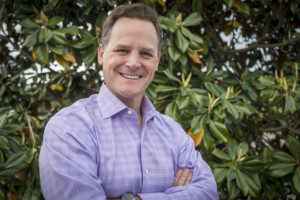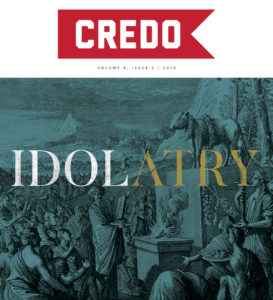You are a fourth-generation pastor. What impact did growing up in a family of pastors have on you and when did you first consider vocational ministry?
At the age 15, I experienced a call to preach. Nothing dramatic, just so clear that one day I would be preaching. Accepting the call was not difficult since all our family did was produce preachers. I preached my first sermon at 18.
There is a tremendous sense of stewardship. I’m one of about a dozen in my family in full-time ministry. It’s a reminder that we live in a cohort bigger than any one of us. Run well, pass the baton.
 Other than preachers in your family, is there a preacher from church history that has consistently ministered to you and instructed your preaching?
Other than preachers in your family, is there a preacher from church history that has consistently ministered to you and instructed your preaching?
Well, there are several. I love Whitefield for his example of being totally consumed with Scripture; Edwards for his breadth and humility. I wrote my dissertation on François Fénelon and his Dialogues on Eloquence. He argued for a simplicity in preaching that was in its own way a push back to the excess of what was called the Golden Era of French preaching. He also was outspoken against the abuses in the court of Louis IX. Of course, he was a Catholic mystic, so there is a lot to disregard. Still, his understanding of preaching as humility, as an act of deference to God, is something that has impressed me ever since first reading the Dialogues.
In what ways, have you grown as a preacher through preaching weekly as pastor of Immanuel Baptist Church?
In the classroom, I spent years trying to understand how sermons are formed. What I knew intellectually, but now experiencing, is that there is a difference between interpreting, understanding the theology and semantic structure of a text, and the formation of a sermon in the heart, for a particular people, at a particular time. It is more organic and supernatural than one can describe in a classroom. It’s very real. In order to communicate we need to know God, know his word, and know his people. Sermons are formed in this triangulation. In order to communicate we need to know God, know his word, and know his people. Sermons are formed in this triangulation. Share on X It’s not linear.
From 2004-2016 you served in various administrative capacities at Southwestern Baptist Theological Seminary in Fort Worth, TX. What advice would you give to someone transitioning from an academic setting into the pastorate?
While I tried to administrate with pastoral finesse, the difference is that a pastor is more aligned with the needs of people. It is more relational and less institutional. My advice would be simply to enjoy that reality and love people.
Making decisions can be difficult, especially when the decision involves moving to a new place and taking up a new ministry. What were principles helpful to you in discerning whether to leave Southwestern Seminary and pastor Immanuel Baptist Church?
Following a call to Immanuel was consistent with the call to preach I received at 18. I believe in training preachers at the seminary level and I still teach adjunctivley, yet I do so as an extension of the call to preach. So this seemed like a new assignment in the same direction. I have trusted friends who knew the church and knew me and affirmed that the fit was good.
You have written a book titled, Recapturing the Voice of God, wherein you guide the reader in how to preach genre-sensitive, text-driven sermons. What tools must a pastor have to preach such sermons?
In Recapturing I’m arguing that there is meaning on the structural level of the text. The text-driven sermon allows the meaning found in the structure of the text to influence the structure of the sermon.
The only way to effectively accomplish this is to read and re-read the text. Spending the first few hours of sermon prep just reading the text is invaluable. Regarding tools, I recommend exegetical commentaries that would help you understand the structure from a macro level. I love commentaries, but often detailed exegesis hides the reality that there is a macro level structure. Commentators, saddled with years of exegetical history, often manage that weight with information that, while interesting, will never influence pulpit communication. For balance one is helped by works like Semantic and Structural Analysis produced by SIL (Wycliffe). A short commentary whose interpretation is influenced by structure.
How would you encourage a pastor to rightly preach and counsel against the sin of idolatry?
Sunday, I preach Nehemiah 13. Of course, Nehemiah chronicles the last events of the Old Testament, and chapter 13 is a description of Nehemiah’s final reforms. The last great sin he deals with, in this very last chapter, is idolatry. He even mentions Solomon by name (13:26). Nehemiah summarizes his last reforms in v. 30 when he says, “Thus I cleansed them from everything foreign…”. This is a great definition of idolatry, “everything foreign.”
This is so fascinating. The last sin in the Old Testament is idolatry. God had a favorite people and they had a favorite sin, idolatry. God was exclusive, they were inclusive. He loved them, they loved to displace Him. What God wanted was their affection (Jer. 9:23,24), but they loved other things.
And so, Nehemiah’s last reform, the last sin of the Old Testament, was idolatry.
There is something instructive there. Of the hundreds of years recorded in the Old Testament, this never changed. The infection of displaced love has deep ancestral roots in our faith. We love to love other things besides God. I will always have to guard my heart against “everything foreign.”
So, my answer would be to preach the Old Testament. Idolatry is in Genesis – Nehemiah. Then be graciously plaintiff about calling out idolatry in our hearts.
Do you have a favorite aspect of the sermon preparation process?
Yes, it’s generally the first two days, out of the four mornings of prep. Specifically, I love the first day when I am reading and rereading a text trying to understand the structure. It generally does not come easy and its an enjoyable challenge. Once the structure is clear there is the challenge of re-presenting that structure in a way that is consistent with the biblical author but is also compelling and interesting. The tension between faithful re-presentation of the text and engaging communication is a challenge. Laziness lay in wooden exegesis or fluffy rhetoric. Wooden exegesis is missing the hard work of rhetorical finesse and communication. Fluffy rhetoric is missing the hard work of exegesis. Both are boring: one emotionally boring, and the other intellectually boring. Since the Scripture is never boring, this is a misrepresentation of Scripture.
Why might reading and writing in areas broader than the next sermon be profitable for pastors?
This weekend I saw two documentaries. One on the first African American mayor of Atlanta, and the other on one of the most devious art forgers in history. Both filled gaps in my understanding of those aspects of culture. Reading in other areas such as history, world wars, biography, current or cultural movements stretches us. In reading anthologies you can touch a genre (poetry or short stories) without going further than you have time for. For three years, I was dean of a college that was a great books college. Reading the great books can help a great deal. For example, if you want to form an opinion about a Christian doing yoga, don’t read a modern blog, read the Bhagavad Gita. There are about 40 books that have shaped all Western thought. It’s helpful to be familiar with them, even if in a cursory way.
The reality is that there is so much to be read in theology, biblical studies, and works related to ministry that there is a tinge of guilt when we pick up a book that is not directly related to the ministry. However, we need to have a reading that is diversion and rest. Otherwise reading is always equated with work. Someone told me that every fourth book they read is out of their field. It seems like a practice like this would be helpful.
What is the biggest blunder you’ve ever made in the pulpit or lectern?
Oh man. Assuming you’re going to print this I’m not even tempted to say. Probably, the biggest mistakes I have made have been typical: lack of preparation, feeling overconfident, or entering the pulpit and not knowing the text. And, honestly, where I have made gaffes, they typically result from not knowing exactly what I was going to say in the pulpit to begin with. The mind is overcompensating, and not in a good way. Making a written or oral manuscript helps a great deal.


